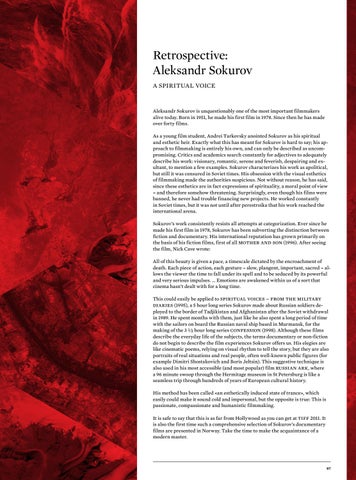Retrospective: Aleksandr Sokurov A SPIRITUAL VOICE
Aleksandr Sokurov is unquestionably one of the most important filmmakers alive today. Born in 1951, he made his first film in 1978. Since then he has made over forty films. As a young film student, Andrei Tarkovsky anointed Sokurov as his spiritual and esthetic heir. Exactly what this has meant for Sokurov is hard to say; his approach to filmmaking is entirely his own, and can only be described as uncompromising. Critics and academics search constantly for adjectives to adequately describe his work: visionary, romantic, serene and feverish, despairing and exultant, to mention a few examples. Sokurov characterizes his work as apolitical, but still it was censured in Soviet times. His obsession with the visual esthetics of filmmaking made the authorities suspicious. Not without reason, he has said, since these esthetics are in fact expressions of spirituality, a moral point of view – and therefore somehow threatening. Surprisingly, even though his films were banned, he never had trouble financing new projects. He worked constantly in Soviet times, but it was not until after perestroika that his work reached the international arena. Sokurov’s work consistently resists all attempts at categorization. Ever since he made his first film in 1978, Sokurov has been subverting the distinction between fiction and documentary. His international reputation has grown primarily on the basis of his fiction films, first of all mother and son (1996). After seeing the film, Nick Cave wrote: All of this beauty is given a pace, a timescale dictated by the encroachment of death. Each piece of action, each gesture – slow, plangent, important, sacred – allows the viewer the time to fall under its spell and to be seduced by its powerful and very serious impulses. … Emotions are awakened within us of a sort that cinema hasn’t dealt with for a long time. This could easily be applied to spiritual voices – from the military diaries (1995), a 5 hour long series Sokurov made about Russian soldiers deployed to the border of Tadjikistan and Afghanistan after the Soviet withdrawal in 1989. He spent months with them, just like he also spent a long period of time with the sailors on board the Russian naval ship based in Murmansk, for the making of the 3 ½ hour long series confession (1998). Although these films describe the everyday life of the subjects, the terms documentary or non-fiction do not begin to describe the film experiences Sokurov offers us. His elegies are like cinematic poems, relying on visual rhythm to tell the story, but they are also portraits of real situations and real people, often well-known public figures (for example Dimitri Shostakovich and Boris Jeltsin). This suggestive technique is also used in his most accessible (and most popular) film russian ark , where a 96 minute swoop through the Hermitage museum in St Petersburg is like a seamless trip through hundreds of years of European cultural history. His method has been called «an esthetically induced state of trance», which easily could make it sound cold and impersonal, but the opposite is true: This is passionate, compassionate and humanistic filmmaking. It is safe to say that this is as far from Hollywood as you can get at tiff 2011. It is also the first time such a comprehensive selection of Sokurov’s documentary films are presented in Norway. Take the time to make the acquaintance of a modern master.
97

















